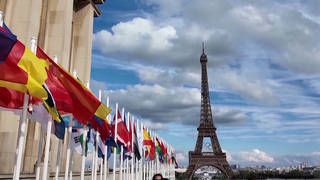
Ibtihaj Muhammad, who is an African-American Muslim woman, has became the first U.S. athlete to compete at the Olympic Games wearing a hijab. She won a bronze medal Saturday in the women’s team saber fencing. “I remember being a kid and being told that there were things I couldn’t do, you know, whether that be because I was a girl or because I was African-American or because I was Muslim,” said Muhammad. “So, to be able to stand on top of that podium and represent our country, and to show, you know, girls out there, to show our youth out there, that they can accomplish anything.” We speak to Jesse Washington, senior writer for The Undefeated.
Transcript
AMY GOODMAN: I wanted to bring Jesse Washington back into the conversation, but go to a clip of Ibtihaj Muhammad, who is an African-American Muslim woman who became the first U.S. athlete to compete at the Olympic Games wearing a hijab. She won a bronze medal Saturday in the women’s team saber fencing.
IBTIHAJ MUHAMMAD: I remember being a kid and being told that there were things I couldn’t do, you know, whether that be because I was a girl or because I was African-American or because I was Muslim. So, to be able to stand on top of that podium and represent our country, and to show, you know, girls out there, to show our youth out there, that they can accomplish anything.
AMY GOODMAN: That’s Ibtihaj Muhammad, an African-American Muslim woman, yes, competed in the Olympics in her hijab. Jesse Washington, can you talk about her?
JESSE WASHINGTON: Yes. I was really touched by this, by one simple sight with this American woman. She’s out there competing for her country, and on the back of her fencing outfit is her name in big letters, “Muhammad,” and right under that, “U.S.A.” And to me, that was really profound, especially in this moment, nationally, where we’re debating even letting Muslims into the country. Here is a woman who has the most Muslim name of all, and it says, “Muhammad, U.S.A.” And she’s winning medals for America. So, to me, that’s definitive proof that Muslims are a part of our nation, they’re part of this tapestry, just like all the other religions. And America was a nation founded on the principle of freedom and religious freedom. So, she wore the hijab. She also wore the name. And she excelled and won a medal. And so, to me, I was very touched. And I think that that’s a powerful lesson that a lot of people should pay attention to in this current time.
AMY GOODMAN: Anthony, we’re going to have to go, and we’re going to continue the conversation after. But, very quickly, Monica Puig won Puerto Rico’s first Olympic gold medal. She chose to play for Puerto Rico. She had the choice of the U.S. or Puerto Rico. The significance of this?
JESSE WASHINGTON: Yeah, I have a lot of Boricua friends from New York City, and they’re Puerto Rican. And I know they’re citizens and everything, but they really rep for their island, their culture, their country. A lot of Puerto Ricans feel that they should be independent from the United States. So, that’s a huge moment. Viva Boricua. That’s—what more can I say?
AMY GOODMAN: Well, we’re going to leave it there, but we’re going to continue the conversation with Jesse Washington, senior writer for The Undefeated, and Anthony Ervin. His new book is called Chasing Water: Elegy of an Olympian, the oldest swimmer to win in this year’s Rio Olympics.












Media Options